
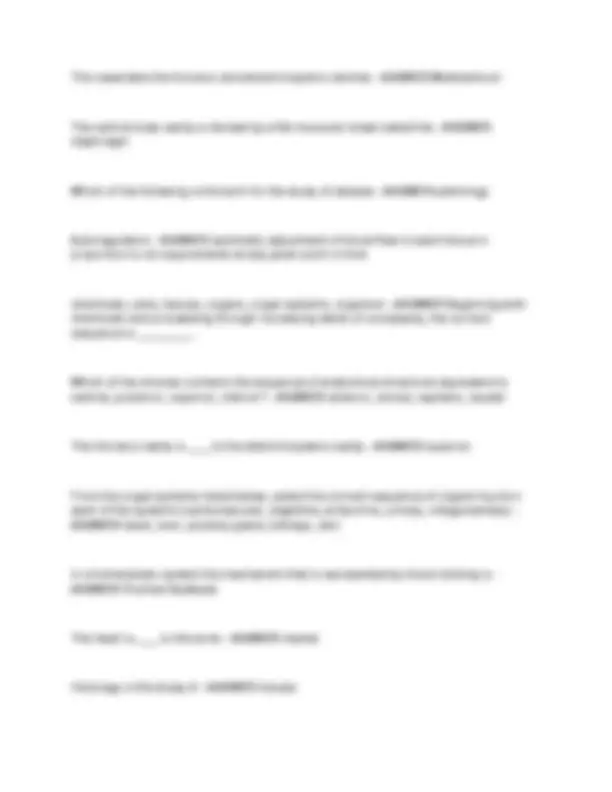
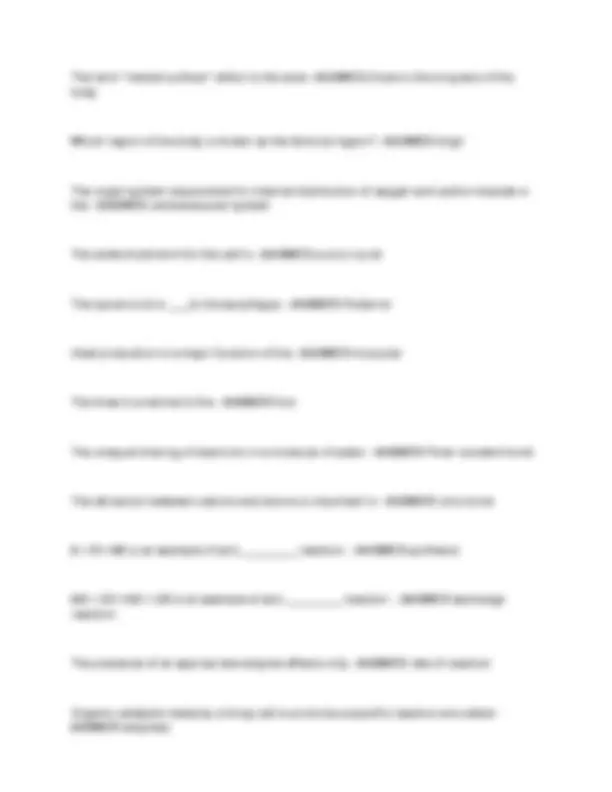
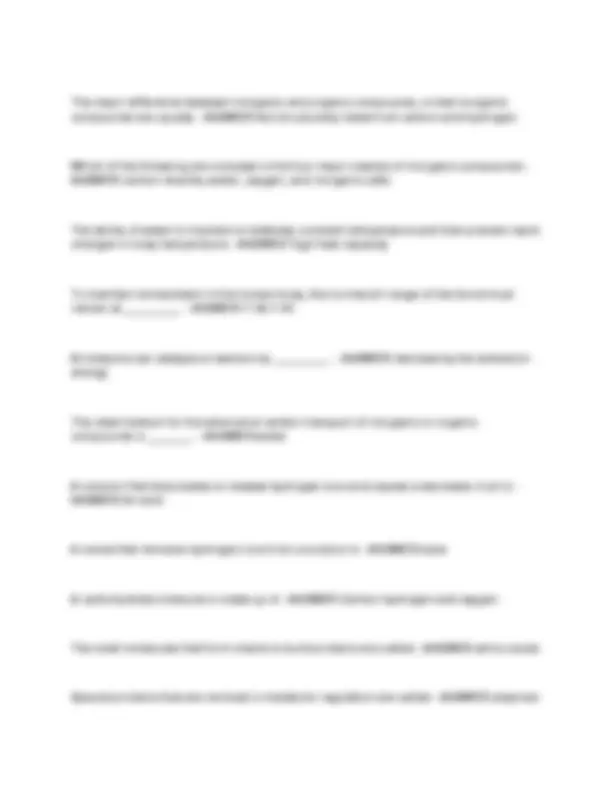
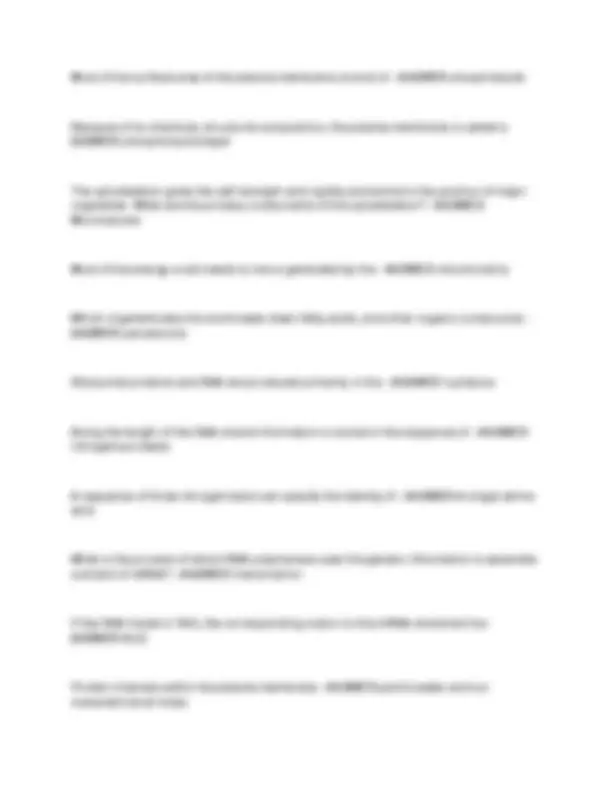
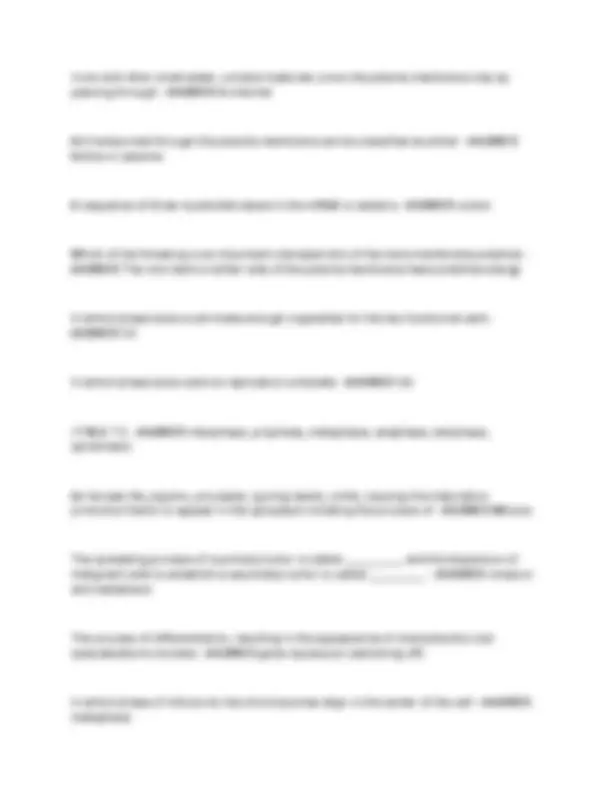
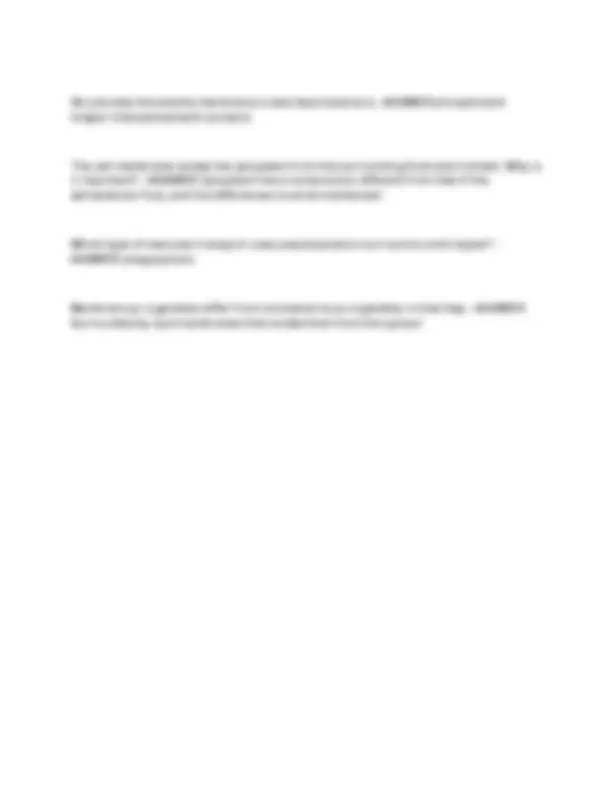


Study with the several resources on Docsity

Earn points by helping other students or get them with a premium plan


Prepare for your exams
Study with the several resources on Docsity

Earn points to download
Earn points by helping other students or get them with a premium plan
Community
Ask the community for help and clear up your study doubts
Discover the best universities in your country according to Docsity users
Free resources
Download our free guides on studying techniques, anxiety management strategies, and thesis advice from Docsity tutors
(BSC 2085) BSC2085 NEW EXAM WITH COMPLETE SOLUTIONS 100% VERIFIED!!
Typology: Exams
1 / 10

This page cannot be seen from the preview
Don't miss anything!







What is the role of the effector in homeostatic regulation? - ANSWER to respond to theoutput of the control center
In descriptions of the superficial anatomy of the human body, the neck is the __________region. - ANSWER cervical
In which quadrant would you find the liver? - ANSWER right upper Anatomy is to ________ as physiology is to ________. - ANSWER structure and function Systemic anatomy considers the structure of major ____ whereas surface anatomyrefers to the study of ____ - ANSWER organ systems; superficial markings
What is the name of the serous membrane that covers the surface of the heart -ANSWER visceral pericardium
The specialized study that analyzes the structure of individual cells is called __________.- ANSWER cytology
The scientist who studies the effects of diseases on organ or system functions is a -ANSWER pathophysiologist
The level of organization that reflects the interactions between organ systems is the -ANSWER organism
The two regulatory systems of the body are the endocrine system and the _______. -
ANSWER nervous system Homeostasis refers to - ANSWER the tendency to maintain a steady internal state negative feedback - ANSWER a mechanism of response in which a stimulus initiatesreactions that reduce the stimulus
positive feedback - ANSWER A physiological control mechanism in which a change insome variable triggers mechanisms that amplify the change.
When a person is lying face up in anatomical position, the individual is said to be -ANSWER supine
Moving along the surface of the skin from the wrist towards the elbow is an example ofmoving in a ____ direction - ANSWER Proximal
Making a sagittal section results in the separation of __________. - ANSWER right and leftportions of the body
A plane that is cut parallel to the midsagittal plane is a __________. - ANSWERparasagittal section
The two subdivisions of the ventral body cavity are the - ANSWER thoracic andabdominopelvic cavities
The subdivisions of the thoracic body cavity are the - ANSWER Pleural and pericardialcavities
The heart and the lungs are located in the _____ cavity - ANSWER thoracic
The term "medial surface" refers to the area - ANSWER Close to the long axis of thebody
Which region of the body is known as the femoral region? - ANSWER thigh The organ system responsible for internal distribution of oxygen and carbon dioxide isthe - ANSWER cardiovascular system
The anatomical term for the calf is - ANSWER sura or sural The spinal cord is ____to the esophagus - ANSWER Posterior Heat production is a major function of the - ANSWER muscular The knee is proximal to the - ANSWER foot The unequal sharing of electrons in a molecule of water - ANSWER Polar covalent bond The attraction between cations and anions is important in - ANSWER ionic bond A + B > AB is an example of a(n) __________ reaction. - ANSWER synthesis AB + CD > AD + CB is an example of a(n) __________ reaction. - ANSWER exchangereaction
The presence of an appropriate enzyme affects only - ANSWER rate of reaction Organic catalysts made by a living cell to promote a specific reaction are called -ANSWER enzymes
The major difference between inorganic and organic compounds, is that inorganiccompounds are usually - ANSWER Not structurally made from carbon and hydrogen
Which of the following are included in the four major classes of inorganic compounds -ANSWER carbon dioxide, water, oxygen, and inorganic salts
The ability of water to maintain a relatively constant temperature and then prevent rapidchanges in body temperature - ANSWER High heat capacity
To maintain homeostasis in the human body, the normal pH range of the blood mustremain at __________. - ANSWER 7.35-7.
An enzyme can catalyze a reaction by __________. - ANSWER decreasing the activationenergy
The ideal medium for the absorption and/or transport of inorganic or organiccompounds is ________. - ANSWER water
A solution that dissociates to release hydrogen ions and causes a decrease in ph is -ANSWER An acid
A solute that removes hydrogen ions from a solution is - ANSWER base A carbohydrate molecule is made up of - ANSWER Carbon hydrogen and oxygen The small molecules that form chains to build proteins are called - ANSWER amino acids Special proteins that are involved in metabolic regulation are called - ANSWER enzymes
__________. - ANSWER store and process information at the molecular level What are isotopes of an element? - ANSWER Atoms whose nuclei contain the samenumber of protons, but different numbers of neutrons
What happens to an enzyme that is subject to extremely high temperature - ANSWER Itbecomes denatured
If the second energy level of an atom has one electron, how many more electrons does itneed in order for that energy level to be filled to its maximum capacity? - ANSWER 7
Which type of lipid is a good energy source, provides insulation and helps protectdelicate organs - ANSWER triglycerides
Which one of the following selections represents the ph of the weakest acid - ANSWER6.
Which type of bond has the most important effects on the properties of water and theshapes of complex molecules? - ANSWER hydrogen bond
If oxygen has an atomic weight of 16, what is the molecule weight of an oxygen molecule- ANSWER 32
Two simple sugars joint together form a disaccharide the reaction involved requires -ANSWER The removal of water to create a more complex molecule
Why does the hemoglobin molecule qualify as a quaternary protein source? - ANSWER Ithas four interacting, globular subunits
Are not membranous organelles - ANSWER Microvilli and centrioles
Most of the surface area of the plasma membrane consist of - ANSWER phospholipids Because of its chemical, structural composition, the plasma membrane is called a -ANSWER phospholipid bilayer
The cytoskeleton gives the self strength and rigidity and anchors the position of majororganelles. What are the primary components of the cytoskeleton? - ANSWER Microtubules Most of the energy a cell needs to live is generated by the - ANSWER mitochondria Which organelle absorbs and breaks down fatty acids, and other organic compounds -ANSWER peroxisome
Ribosomal proteins and RNA are produced primarily in the - ANSWER nucleolus Along the length of the DNA strand information is stored in the sequence of - ANSWERnitrogenous bases
A sequence of three nitrogen basis can specify the identity of - ANSWER A single aminoacid
What is the process of which RNA polymerase uses the genetic information to assemblea strand of mRNA? - ANSWER transcription
If the DNA triplet is TAG, the corresponding codon on the mRNA strand will be -ANSWER AUC
Protein channels within the plasma membrane - ANSWER permit water and ionmovement at all times
Structurally the plasma membrane is best described as a - ANSWER phospholipidbilayer interspersed with proteins
The cell membrane isolate the cytoplasm from the surrounding fluid environment. Why isit important? - ANSWER Cytoplasm has a composition different from that of the extracellular fluid, and the differences must be maintained Which type of vesicular transport uses pseudopodia to surround a solid object? -ANSWER phagocytosis
Membranous organelles differ from nonmembrnous organelles in that they - ANSWERSurrounded by lipid membranes that isolate them from the cytosol